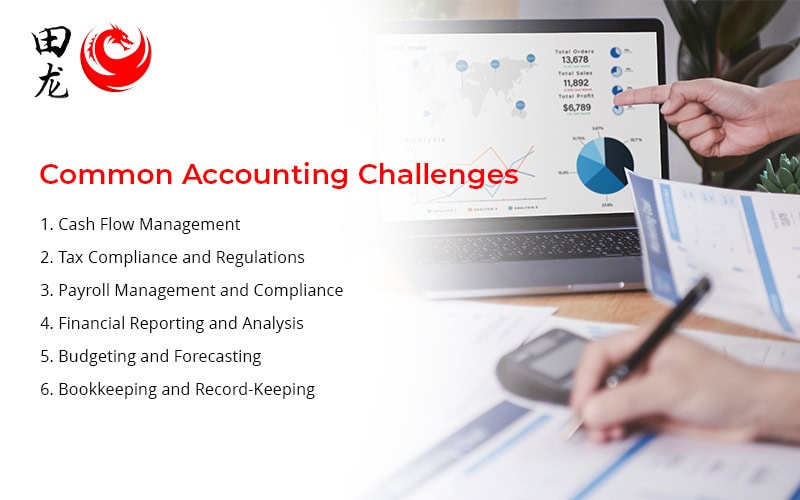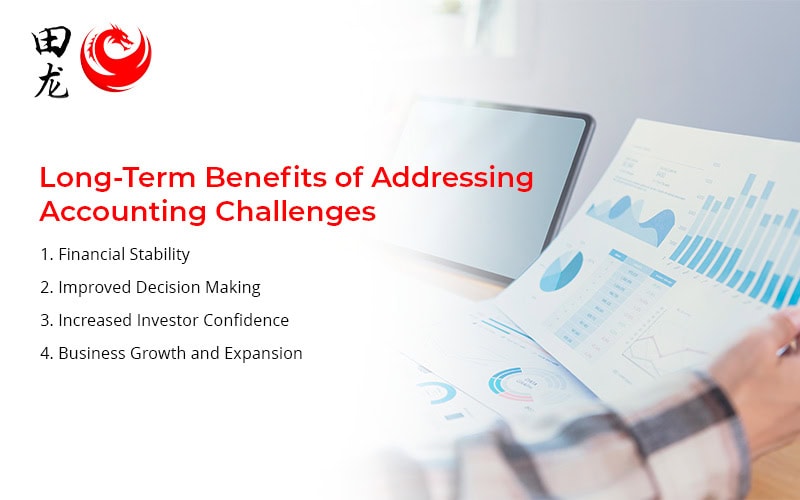Effective accounting is more than just number crunching—it is a key component of sustainable growth and informed decision-making. Accurate financial management and tracking not only ensure regulatory compliance but also provide valuable insights into cash flow, operational performance, and long-term profitability. This is essential for scaling a business sustainably.
However, when accounting practices fall short and accounting challenges emerge, the consequences can be severe. Poor financial management may lead to cash flow issues, missed compliance deadlines, inaccurate financial reporting, and other discrepancies. All of these potentially destabilise a business and hinder its growth.
Therefore, recognising and addressing these accounting challenges is crucial for safeguarding your organisation’s financial health. In this article, we will explore the common accounting hurdles encountered by businesses and how practical strategies can overcome them. Join us as we empower you to build a stronger foundation for success.
The Relationship Between Accounting and Business Operations
The Role of Accounting in Driving Business Growth
Accounting plays a pivotal role in steering a business towards growth and success. By ensuring accurate financial tracking, it enables organisations to make strategic choices and achieve long-term financial stability. Here’s how accounting drives business growth:
1. Financial Reporting and Analysis
Accounting involves maintaining accurate financial records, including balance sheets, income statements, and cash flow statements. These documents provide a snapshot of a company’s financial health, demonstrating different aspects such as profitability, cash reserves, and liabilities.

With precise financial reporting, executives can better evaluate investment risks and opportunities. For example, understanding a company’s cash flow position can inform decisions about scaling operations or pursuing new markets, keeping growth initiatives well-founded and sustainable.
2. Tracking Performance
By comparing current data with historical records and industry benchmarks, accounting helps businesses track and measure performance over time. This analysis highlights trends, uncovers inefficiencies, and evaluates the effectiveness of strategies.
For instance, a comparison of current and previous year revenues can reveal growth patterns. It analyses expenses against industry averages to identify potential cost-saving opportunities. With this knowledge, businesses can refine their operations, improve cash flow optimisation, and stay ahead in a competitive market.
3. Budgeting and Forecasting
Effective budgeting and forecasting help to manage resources and plan for the future. Accounting provides detailed financial projections that support businesses in allocating resources wisely, prioritising initiatives, and controlling expenses.
A well-structured budget guarantees sufficient funding for major projects. Similarly, accurate forecasting allows businesses to anticipate financial challenges, preparing for market shifts and potential growth.
4. Risk Management
One of the most significant roles of accounting is in identifying and mitigating financial risks. Businesses can analyse financial records and cash flow forecasts to pinpoint potential issues, including liquidity shortfalls, rising costs, or declining revenues.
Proactive risk mitigation allows businesses to determine accounting challenges and implement corrective measures early. By securing additional financing, adjusting budgets, or taking other necessary actions, businesses can safeguard their operations for sustained growth.

Common Accounting Challenges
While accounting serves as a fundamental tool for business growth, it also comes with a set of challenges. Many businesses, especially smaller ones, encounter various accounting challenges that can hinder their financial stability and overall performance. These issues, if not addressed promptly, can lead to serious setbacks. Below are some of the most common accounting challenges businesses face:

1. Cash Flow Management
Cash flow is the lifeblood of any business, yet it can often be unpredictable. Irregular revenue cycles, delayed client payments, or overspending can all contribute to cash flow issues.
When cash flow is not properly managed, businesses may struggle to meet operational costs. These include paying employees, covering overheads, and fulfilling vendor obligations. In addition, delayed payments can lead to strained relationships with suppliers. A lack of cash reserves may also result in missed opportunities for expansion or investment.
2. Tax Compliance and Regulations
Navigating complex tax laws and regulations is often a daunting task for many businesses, especially those without dedicated tax teams or sufficient resources. Worse still, changes in tax legislation or the introduction of new compliance requirements can add to the confusion.
Failed tax compliance may result in hefty fines, audits, or even legal consequences. Apart from the immediate financial burden, non-compliance potentially damages a company’s reputation, causing clients, suppliers, and investors to lose trust. Therefore, staying on top of tax laws and ensuring accurate reporting is vital.

3. Payroll Management and Compliance
Manual payroll system management can be both time-consuming and prone to errors, particularly for small businesses. Ensuring compliance with local labour laws, including tax withholdings, employee benefits, and overtime pay, may further complicate payroll processing.
Payroll errors can have serious consequences, including employee dissatisfaction, legal breaches, and costly penalties. Mistakes in calculating salaries, bonuses, or benefits can also cause payment delays, affecting employee morale and productivity. Moreover, businesses are likely to face costly penalties due to non-compliance with tax regulations.
4. Financial Reporting and Analysis
Without engaging a dedicated finance team or a dependable accountant in Singapore, small businesses often find it challenging to generate and interpret accurate financial reports. This task requires a solid understanding of financial statements and the ability to extract meaningful insights from data.
As a result, businesses may miss early signs of financial stress or fail to identify opportunities for growth. Inaccurate or incomplete reports can prevent decision-makers from making informed choices about investments, operational adjustments, or cost-cutting measures. Furthermore, poor financial analysis can lead to misguided strategies. This accounting challenge can impact business growth.
5. Budgeting and Forecasting
Inconsistent budgeting and difficulty projecting future expenses and income are also common accounting challenges. Without accurate budgets and forecasts, it becomes nearly impossible to plan for future growth or navigate unforeseen financial challenges.
Due to inefficient resource allocation, a lack of effective budgeting may prompt overspending. Furthermore, businesses are likely to miss valuable reinvestment opportunities or fail to anticipate cash flow shortfalls. Without seeking professional accounting services in Singapore to conduct a clear financial forecast, businesses risk being unprepared for downturns or market shifts, and even operational disruptions.
6. Bookkeeping and Record-Keeping
Inconsistent or inaccurate bookkeeping is another notable accounting challenge, typically stemming from a lack of time, resources, or expertise. Maintaining accurate records for all transactions is crucial for tax filings, financial reporting, and overall financial health.
Poor bookkeeping can lead to errors in tax filings, which may result in missed deductions or penalties. Without professional assistance from accountancy services in Singapore, inaccurate records can present, confusing the process of preparing financial statements or undergoing audits. It may also further complicate tax compliance and financial reporting.
Strategies for Overcoming Accounting Challenges
How to Resolve Common Accounting Challenges
Overcoming accounting challenges requires a proactive and strategic approach to ensure accuracy, efficiency, and compliance. By implementing the right solutions, businesses can streamline their financial processes and focus on growth. Explore the following strategies to address these issues effectively.
1. Leveraging Accounting Software
Accounting software solutions simplify and automate routine financial tasks, such as tax calculations, payroll management, and invoicing. Not only does it save time, but it also reduces the risk of human error for enhanced compliance and accuracy.
Popular accounting tools like QuickBooks, Xero, FreshBooks, and Zoho Books are designed to meet the varying needs of small and medium-sized businesses. They offer user-friendly interfaces, cloud-based accessibility, and robust features tailored to different industries.

Steps for Implementation:
-
Select the Right Software
Before choosing the software, evaluate your business’s specific needs. These include scalability, reporting capabilities, and integration with existing tools.
-
Integrate with Existing Systems
Ensure the software works seamlessly with other business tools, such as customer relationship management (CRM) systems or inventory trackers.
-
Train Your Team
Provide thorough training for employees who will use the software. The key is to maximise its potential and ensure proper implementation.
2. Outsourcing Accounting Tasks
Outsourcing accounting services in Singapore allows businesses to access expert knowledge and minimise errors. At the same time, it frees up time for owners and managers to concentrate on core business operations.
Common tasks that can be effectively outsourced include tax filing, payroll processing, financial reporting, and bookkeeping. These are often time-intensive and require specialised expertise.
How to Choose an Accounting Partner:
-
Industry Expertise
Select an accounting services provider in Singapore who possesses experience in your industry. A qualified professional should understand your unique financial needs and be capable of addressing accounting challenges.
-
Pricing Models
Compare cost structures, such as fixed fees or hourly rates, to find an arrangement that aligns with your budget.
-
Scalability
Scalability refers to a provider’s ability to adjust their services as your business changes. As businesses expand, their financial operations often become more complex, requiring more sophisticated tools and greater expertise. Be mindful to choose one that can adapt to your business’s growth and evolving needs.
-
Personalised Service
Steer away from a one-size-fits-all solution. You should engage a partner who offers tailored advice and support to suit your business’ circumstances.
3. Establishing a Regular Financial Review Process
Conducting monthly or quarterly financial reviews helps businesses maintain a clear understanding of their financial health. This proactive approach enables them to identify and tackle potential issues before they escalate. During each review, focus on some key metrics as below:
-
Profit Margins
Determine how efficiently your business is generating profits relative to revenue.
-
Cash Flow
Monitor the flow of funds in and out of your business to avoid liquidity issues.
-
Return on Investment (ROI)
Measure the profitability of investments or projects.
-
Revenue Growth
Track trends in sales to gauge business expansion.
-
Expenses
Identify areas where costs can be reduced to improve profitability.
-
Debts
Determine outstanding liabilities and ensure they remain manageable.
By implementing these strategies, businesses can overcome the most common accounting challenges and build a robust financial framework.
Long-Term Benefits of Addressing Accounting Challenges
Addressing common accounting challenges resolves immediate issues, laying a solid foundation for long-term business success. Through proactive steps, businesses can streamline financial processes, benefitting from sustainable growth and profitability. In this section, we will dive into the long-term benefits of coping with accounting challenges.

1. Financial Stability
When businesses tackle accounting challenges head-on, they are better equipped to maintain financial stability. Overcoming issues like cash flow mismanagement and inaccurate record-keeping can maintain smooth business operations.
By having accurate and up-to-date financial data, businesses find it easier to manage their cash flow, avoid late payments, and improve profitability. This stability allows businesses to stay solvent and weather market fluctuations.
2. Improved Decision Making
Accurate, timely financial information empowers business owners and decision-makers to make informed choices. Whether considering new investments, expanding operations, or cutting costs, businesses that resolve accounting challenges tend to gain a better understanding of their financial health. This clarity leads to more strategic decisions that are aligned with the company’s long-term goals. With reliable data at hand, business owners can better assess risks and forecast future trends, making informed decisions that drive the business forward.
3. Increased Investor Confidence
Trust paves the way for successful business relationships, especially with investors, lenders, and stakeholders. In this context, consistent retrieval of accurate financial records and the agility in addressing discrepancies build credibility. When investors see that a business is committed to maintaining sound financial practices and complies with accounting standards, they are more likely to trust the business with their capital. This, in turn, can facilitate easier access to funding and open doors for future investment opportunities, ultimately supporting the business’s long-term growth.

4. Business Growth and Expansion
As businesses refine their accounting practices, they unlock the ability to reinvest profits wisely and scale their operations effectively. By freeing up resources that would otherwise be lost to inefficient accounting or compliance issues, businesses can focus on strategic initiatives such as expanding into new markets or developing new products. Moreover, sound financial management enables companies to track growth indicators, making it easier to identify and seize new opportunities. With a solid financial foundation, businesses are better equipped to scale up operations, hire more staff, or invest in innovative technologies.
Frequently Asked Questions
1. Can accounting challenges be avoided entirely?
While it may not be possible to avoid all accounting challenges, many can be minimised through proper planning, accurate record-keeping, and leveraging professional services.
2. How can I scale my business accounting as it grows?
As your business grows, it’s important to upgrade your accounting systems, hire experienced professionals, and use software that can handle larger volumes of data.
3. What are some red flags that my business is facing accounting issues?
Red flags include frequent discrepancies in financial records, late tax filings, poor cash flow, unpaid invoices, or a lack of financial visibility and reports.
Conclusion
Addressing accounting challenges proactively paves the way for the long-term success and stability of your business. By recognising accounting as a strategic tool rather than just a routine task, you can improve financial outcomes and build a more resilient organisation.
At Tianlong Services, we offer competitive pricing, a fast response time, and a one-month free trial bookkeeping service to help small businesses streamline their financial operations. Our team of experts is here to assist you with all aspects of accounting, ensuring your business remains compliant and financially healthy.
If you are seeking professional accounting services for small businesses in Singapore, start your free trial with us today to move toward financial success!
Contact us for more information.

